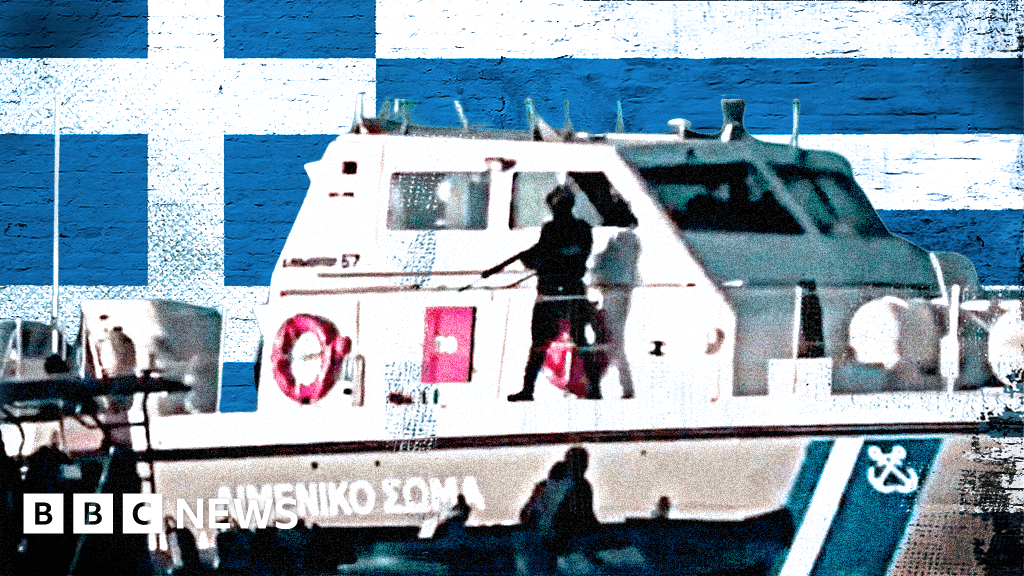The Greek coastguard has caused the deaths of dozens of migrants in the Mediterranean over a three-year period, witnesses say, including nine who were deliberately thrown into the water.
The nine are among more than 40 people alleged to have died as a result of being forced out of Greek territorial waters, or taken back out to sea after reaching Greek islands, BBC analysis has found.
The Greek coastguard told our investigation it strongly rejects all accusations of illegal activities.
We showed footage of 12 people being loaded into a Greek coastguard boat, and then abandoned on a dinghy, to a former senior Greek coastguard officer. When he got up from his chair, and with his mic still on, he said it was “obviously illegal” and “an international crime”.
…
In five of the incidents, migrants said they were thrown directly into the sea by the Greek authorities. In four of those cases they explained how they had landed on Greek islands but were hunted down. In several other incidents, migrants said they had been put onto inflatable rafts without motors which then deflated, or appeared to have been punctured.
One of the most chilling accounts was given by a Cameroonian man, who says he was hunted by Greek authorities after landing on the island of Samos in September 2021.
…
“They started with the [other] Cameroonian. They threw him in the water. The Ivorian man said: ‘Save me, I don’t want to die’… and then eventually only his hand was above water, and his body was below.
“Slowly his hand slipped under, and the water engulfed him.”
Our interviewee says his abductors beat him.
“Punches were raining down on my head. It was like they were punching an animal.” And then he says they pushed him, too, into the water - without a life jacket. He was able to swim to shore, but the bodies of the other two - Sidy Keita and Didier Martial Kouamou Nana - were recovered on the Turkish coastline.
It looks like this BBC article has very misleading numbers. Please see:
The UN Refugee Agency - One year on from the tragic shipwreck off Pylos, Greece - 14 June 2024
The boat, carrying up to 750 people according to testimonies, capsized on 14 June 2023. Only 104 people were rescued and 82 bodies were retrieved, leaving hundreds missing.
Since the Pylos shipwreck, more lives have been lost in the Mediterranean Sea. In particular, since 14 June last year, IOM’s Missing Migrants Project has recorded at least 1,516 deaths and disappearances on the Central Mediterranean Route, with 175 recorded on the Eastern Med. In 2023, 3,155 people lost their lives or went missing trying to cross the Mediterranean, while so far in 2024 the toll has reached 923.
This is the best summary I could come up with:
But in four of these cases we were able to corroborate accounts by speaking with eye witnesses.Our research, which features in a new BBC documentary, Dead Calm: Killing in the Med?, suggested a clear pattern.
"He and two others - another from Cameroon and a man from Ivory Coast - were transferred to a Greek coastguard boat, he said, where events took a terrifying turn.“They started with the [other] Cameroonian.
Dead Calm: Killing in the Med?In June 2023, an overloaded trawler flips in front of a Greek coast guard patrol boat.
Our interviewee made it to land where he was eventually spotted by the Turkish coastguard.In the incident with the highest loss of life - in September 2022 - a boat carrying 85 migrants ran into trouble near the Greek island of Rhodes when its motor cut out.Mohamed, from Syria, told us they rang the Greek coastguard for help - who loaded them onto a boat, returned them to Turkish waters and put them in life rafts.
Human rights groups allege thousands of people seeking asylum in Europe have been illegally forced back from Greece to Turkey and denied the right to seek asylum, which is enshrined in international and EU law.Austrian activist Fayad Mulla told us he discovered for himself how secretive such operations seem to be in February last year, on the Greek island of Lesbos.
He replied that they “drive them back”, and said such orders were “from the minister”, adding they would be punished if they failed to stop a boat.Greece has always denied so-called “pushbacks” are taking place.Greece is an entryway into Europe for many migrants.
The original article contains 1,542 words, the summary contains 271 words. Saved 82%. I’m a bot and I’m open source!




